|
|
|
Sort Order |
|
|
|
Items / Page
|
|
|
|
|
|
|
| Srl | Item |
| 1 |
ID:
128473
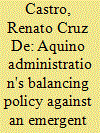

|
|
|
|
|
| Publication |
2014.
|
| Summary/Abstract |
This article examines why and how small powers balance big powers. One such small power is the Philippines, which-despite its military weakness- applies a balancing policy on an emergent China relative to the South China Sea imbroglio. Largely, this balancing policy is the upshot of three developments: a) the present Aquino Administration's efforts to disassociate itself from the previous Arroyo Administration's policy of equi-balancing China and the U.S.; b) China's heavy-handed behavior in the South China Sea dispute; and c) the willingness of the U.S. to assist the Philippines in constraining an assertive China. In conclusion, the article offers two reasons why this balancing policy is risky and difficult. First, the Philippines needs time and resources to develop the military capability to back its territorial claim in the South China Sea; and second, the U.S., though supportive of the Philippine position, is wary of triggering a full-blown geo-strategic rivalry with China.
|
|
|
|
|
|
|
|
|
|
|
|
|
|
|
|
| 2 |
ID:
188430
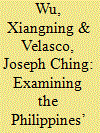

|
|
|
|
|
| Summary/Abstract |
When great powers such as the United States and China grow especially hawkish with more uncertainties, how does a smaller state react to such a complex and dangerous territorial conflict? Given the competing frames of influence between China and the United States, what are the underlying reasons for the shift in the Philippines’ foreign policy? This paper focuses on the Philippines’ changing foreign policy on the South China Sea dispute and examines the main rationale for its shift in strategy towards China. We use the perspective of neoclassical realism to unpack the constraining factors that underlie the Philippines’ domestic politics and ongoing global exigencies. With changes in its domestic politics and the security challenges posed by the evolving geopolitics of the Indo-Pacific region, the Philippines is in a difficult situation, having to choose between a territorially hostile trading partner and its historical security guarantor.
|
|
|
|
|
|
|
|
|
|
|
|
|
|
|
|
| 3 |
ID:
166809
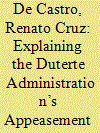

|
|
|
|
|
| Summary/Abstract |
This article examines the reason behind the dramatic shift in Philippine foreign policy under the Duterte Administration. His predecessor, president Benigno Aquino, vigorously challenged China’s expansive territorial claim in the South China Sea throughout his six-year term. However, president Rodrigo Duterte’s actions and pronouncements are undoing the former president’s geopolitical agenda of balancing China’s expansion in the disputed waters. He distances the Philippines from the United States, its long-standing treaty ally, and gravitates toward China. This stance aims to earn goodwill with China so that the Philippines can avail itself of enormous aids and loans from China’s Belt and Road Initiative (BRI). This stemmed from this administration’s fear that the Philippines would not benefit from China’s emergence as an economic power. Nevertheless, by appeasing an expansionist power, the Philippines becomes complicit to China’s long-term strategy of maritime expansion to push the United States out of East Asia. In conclusion, the article warns that the Duterte Administration might end up losing the country’s exclusive economic zone (EEZ) in the South China Sea and the confidence and trust of its allies and security partners. This administration might also leave the public coffers empty and dry because of China’s reneging on its commitment to fund the Philippines’ massive infrastructure-building program, labeled “Build, Build, and Build.”
|
|
|
|
|
|
|
|
|
|
|
|
|
|
|
|
| 4 |
ID:
113923
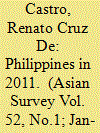

|
|
|
|
|
| Publication |
2012.
|
| Summary/Abstract |
Early this year, a majority of Filipinos indicated in a national survey that they are not sure if Benigno Aquino, III, will succeed or fail in his presidency. This uncertainty stems from his unconventional style of governance and the gravity of the domestic and international problems he faces. Moreover, his style of governance is generally perceived by the Filipinos as reactive and lackluster-a fact attributed to his first year in office, a difficult period of learning and adjustment.
|
|
|
|
|
|
|
|
|
|
|
|
|
|
|
|
| 5 |
ID:
186532
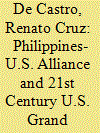

|
|
|
|
|
| Summary/Abstract |
This article situates the Philippines-U.S. alliance within the changing U.S. grand strategies from Barrack Obama’s rebalancing to Asia to President Joe Biden’s continuance of the Trump Administration’s strategic competition with China. Upon President Obama’s announcement of the rebalancing policy in 2011, the Philippines already figured prominently in the American security agenda in Asia, particularly with the intensification of the Philippines-China territorial dispute in the South China Sea. In 2016, President Rodrigo Duterte effected a major shift in Philippine foreign policy by distancing the country from the U.S. and gravitating toward China. The Trump Administration, however, saw the Philippines as a crucial ally in its geostrategic competition with China. Consequently, Washington adopted a policy of strategic patience to bring Duterte onside the U.S. rather than pushing him to China’s embrace. This scheme stabilized the two countries’ security relations and ensured the Philippines’ commitment to the U.S. system of bilateral alliances. In conclusion, the article argues that given the Philippines’ close security ties with the U.S. that often clash with China’s strategic interests and close Philippines-China diplomatic/economic relations, it will be difficult and challenging for President Duterte to pursue an independent foreign policy.
|
|
|
|
|
|
|
|
|
|
|
|
|
|
|
|
| 6 |
ID:
155397


|
|
|
|
|
| Summary/Abstract |
Domestic politics has played an important role in in the dramatic shifts in Philippine policy toward the United States and China, particularly as the South China Sea disputes have intensified. The Arroyo administration attempted to reduce dependency on the United States by engaging China and adopting an equibalancing policy while the subsequent Aquino administration abandoned equibalancing in favor of aligning with the United States against an increasingly assertive China. Today, President Duterte has expressed an intent to separate from the United States and move closer to China in pursuit of a more “independent” foreign policy. Duterte’s rapid consolidation of political power has strengthened his ability to chart the course of Philippine foreign policy, but domestic opposition and potential threats from China could undermine or reverse his course.
|
|
|
|
|
|
|
|
|
|
|
|
|
|
|
|
| 7 |
ID:
101630
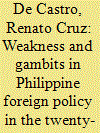

|
|
|
|
|
| Publication |
2010.
|
| Summary/Abstract |
How do resource-starved weak powers adjust to a changing regional system? Looking at the Philippine case, this article examines the direction of the country's foreign policy under the Arroyo administration. Observably, this foreign policy is directed to the generation of external resources that could address the country's main security challenge: domestic insurgencies. To pursue this internal agenda, the Philippines engages both the United States and China in a delicate balancing act. The government has also jump-started its program of development diplomacy, with directives for its embassies and consulates abroad to promote the country's export trade and to protect the rights and welfare of 8.5 million overseas Filipino workers (OFWs). It also utilizes multilateral organizations to advance its national development objectives. However, the country's inherent weakness has constrained its ability to exploit optimally the opportunities created by its fluid external environment. In conclusion, the article contends that unless it consolidates its political base and enhances its economic competitiveness, the Philippines will remain a quintessential weak power in the world of the strong in East Asia.
|
|
|
|
|
|
|
|
|
|
|
|
|
|
|
|
|
|
|
|
|